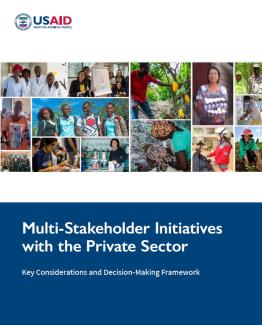USAID engages with many stakeholders, including those in the private sector, to increase the impact of its development efforts and accelerate development progress. Multi-stakeholder initiatives (MSIs) are one key collective-action approach that USAID, working with others, has supported to address highly complex problems. MSIs tackle global challenges in health, agriculture, food security, vulnerable and displaced populations, climate change, the environment, global trade, and digital and financial inclusion. Often, these challenges are complex and systemic in nature and they require collaboration among diverse actors, including the private-sector, donors, non-governmental organizations, civil society organizations, and host-country governments, to mobilize shared knowledge, expertise, technology, business solutions, advocacy, and financial resources.
The COVID-19 pandemic is one area that requires collective action from multiple sectors to directly address the health impacts to save lives as well as the secondary economic and social impacts that have devastated families and communities. MSIs such as Gavi, The Vaccine Alliance, are playing a critical role in incentivizing the development of a vaccine and planning for an effective distribution strategy, particularly to underserved populations. Other MSIs have redirected their efforts in order to address the impacts or disruptions to business models, the workforce, and supply chains.

